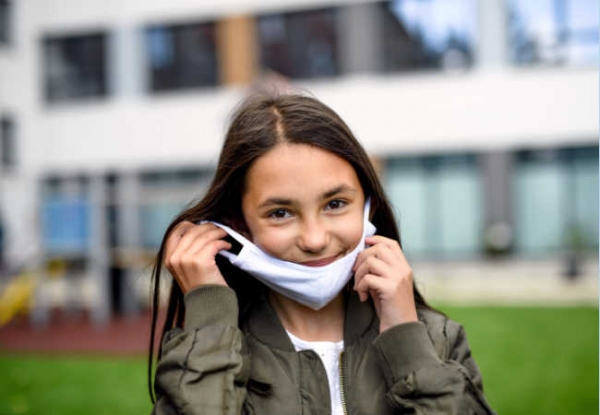Masks are coming off. Concerts are back on. Summer camps are running, and a new school year is just around the corner. For many adults, we are beyond ready to put this pandemic behind us and jump full-fledged back into our normal pre-COVID lives, but for children, the transition might not be so easy...or welcomed. This shift back to normal might feel overwhelming and even a bit scary for a lot of kids, and they’ll need extra support over the coming months from those who love them.
The past year and a half was a long one for us all, but from a child’s perspective, it feels much longer. Children grow and change at such a rapid rate, and a long quarantine period such as this has had an untold impact on their development. I suspect we will be learning about the effects for years to come. Their lives were turned topsy turvy, their peer relationships hit hard, their academics knocked around, and family life likely impacted as well. To expect them to flip the switch back to normal is asking too much. While we adults endured it, our children grew up in the middle of it.
Our kids are likely feeling a lot of swirling and conflicting emotions about this “return to normal.” They may be happy about seeing their friends again and worried if the relationships may feel weird now. They might be excited to get back into the normal routine at school and worried that they’ve fallen behind academically. They could feel excited to rejoin their sports teams and anxious about the busy schedule to come. These conflicting emotions can be confusing, and they may wonder if they’re alone in feeling this way.
The children who struggle with social anxiety and other mental illnesses may notice a rise in symptoms now that they’re expected to face their peers and teachers daily. In our rush to return to normal, we can’t forget about kids like these who maybe aren’t as ready as we are to flip life around again. And for those kids who thrived in a slower-paced world - the introverted kids, the sensitive ones, the quiet souls who did well with online learning, enjoyed sleeping in, and could breathe easier with the comfort of family surrounding them more often, they have something to say, too.
As we move into this next phase, and our children head back to school, camps, clubs, and sports, here are 4 ways we can support them.
- Pay attention. We need to talk to our children about what they are feeling, but more than give advice or cheer them on, we need to hear them out. We need to offer them a safe place to feel all of their conflicting emotions, to tell us about them without us trying to fix them or brush them away. Our kids have been through so much over the last year and a half, and they need to be heard and understood. So, just listen to your children with empathy and compassion for their experiences. If they’re not talking, you can listen to their behavior. If they’re acting out more, irritable, anxious, or displaying more physical symptoms of anxiety, this means they are stressed and need some extra support.
- Give them some control. You may be raring to go with all the activities you were involved in before, and if your child is as well, that’s fine, but many children will need time to transition back to “normal.” Let your child know that they don’t have to jump back into all the things at once. Allow them some autonomy to decide what’s best for them in regards to activities. There has been so much to happen that they have had no control over, so allowing them to have some control over the activities and events they attend could feel very empowering. If they feel more anxious than before about getting out there, offer support and encouragement. If your child needs to ease back in gradually, honor their emotional process and trust that they are doing the best they can.
- Support emotional connections. Psychologist and author Katie Hurley says that “kids develop coping skills within the context of caring relationships.” One of the building blocks of resilience is a sense of safety and security with family and friends. Do things to strengthen your connection such as spending quality time together without distractions like cell phones, and support their positive connections with other adults such as coaches and teachers as well as trusted peers.
- Help them learn problem-solving skills. This pandemic is one of many trials our children will have to overcome in a lifetime. Teach them problem-solving skills by brainstorming solutions together. If they can’t catch up in algebra, what are the solutions? Designated daily study time? A tutor? A meeting with the teacher? If they are having trouble making a decision, teach them to list out the pros and cons and encourage them to look for win-win solutions to conflict. Having these skills will give them the confidence to bounce back from this pandemic and overcome future challenges.

Rebecca Eanes is the bestselling author of multiple books including Positive Parenting: An Essential Guide, The Positive Parenting Workbook, and The Gift of a Happy Mother. She is the grateful mom of two boys.
